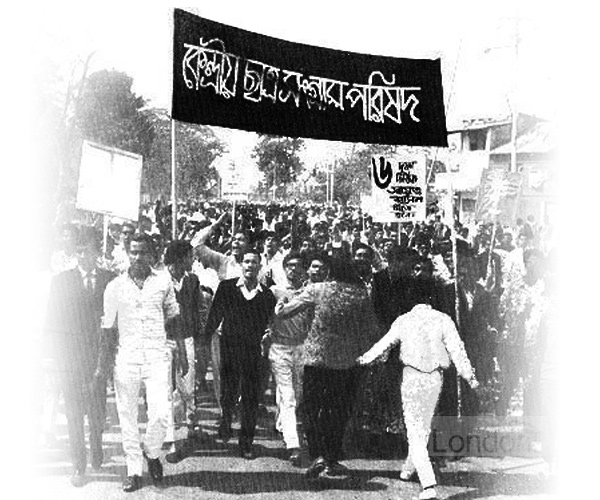
First rally by students change Nazimuddin mind and he signs 8-point agreement
Last updated: 5 October 2017 From the section 1952 Bhasha Andolon
The students from various instituition across Dhaka reacted sharply and a protest strike was observed on 26 February 1948. They paraded through different streets of the city in a procession and gathered in a protest meeting at the Dhaka University campus. The meeting, which was presided over by Prof Abul Kashem, was addressed among others by Naimuddin Ahmad and Mohammad Toaha.
The student's agitation were supported by the Dhaka-based media, especially the Daily Azad, which came down heavily on Khawaja Nazimuddin over his controversial comments in the constituent assembly even labelling it as a 'blunder'.
The rejection of Dhirendranath Dutta's motion in the assembly sent the province into protest mode. It was becoming increasingly obvious that agitation was going to be the next step in the Bangali's rejection of all attempts to foist Urdu on the country as the language of the state.
I know, Sir, I voice the sentiments of the vast millions of our State [of Pakistan]. In the meantime I want to let the House know the feelings of the vastest millions of our State. Even, Sir, in the Eastern Pakistan where the people numbering four crores and forty lakhs [44 million] speak the Bengali language the common man even if he goes to a Post Office and wants to have a money order form finds that the money order is printed in Urdu language and is not printed in Bengali language or it is printed in English. A poor cultivator, who has got his son, Sir, as a student in the Dacca University and who wants to send money to him, goes to a village Post Office and he asks for a money order form, is printed in Urdu language. He can not send the money order but shall have to rush to a distant town and have this money order form translated for him and then the money order, Sir, that is necessary for his boy can be sent. The poor cultivator, Sir, sells a certain plot of land or a poor cultivator purchases a plot of land and goes to the Stamp vendor and pays him money but cannot say whether he has received the value of the money is Stamps. The value of the Stamp, Sir, is written not in Bengali but is written Urdu and English. But he can't say, Sir, whether he has got the real value of the Stamp. These are the difficulties experienced by the common man of the State.
Dhirendranth Datta shares the layman's grievances during his famous speech on 25 February 1948
Second Rashtrobhasha Sangram Parishad
Faced with opposition from the authorities, a fresh new action committee of students was formed on 27 February 1948, the day after student's protest.
A meeting was held at the Tamaddun Majlis office at the Rashid Building which was chaired by Prof Abul Kashem. Here, the Rashtrabasha Sangram Parishad, originally formed by Nurul Huq Bhuiyan, was reconstituted with representatives from Tamaddun Majlis and East Pakistan Muslim Students League. Shamsul Alam, a resident student of Salimullah Muslim Hall and a common member of both Tamaddun Majlis and East Pakistan Muslim Students League, was made the convenor. Few days later, on 2 March 1948, at a meeting held at the Fazlul Huq Muslim Hall, the Sangram Parishad was further expanded by allowing representatives from various other organisations. The only organisation which was not included was the Muslim League.
First uprising
Under the guidance of the new Rashtrobhasha Sangram Parishad a general strike was observed against the rejection of Bengali on 11 March 1948. Its members organised pickets in front of government offices, post offices and courts.
About 50 demonstrators were injured in a police lathis(baton)-charged and a large number of students were arrested. Political leaders such as Shamsul Huq, Shawkat Ali, Kazi Golam Mahboob, Oli Ahad, Sheikh Mujibur Rahman, Abdul Wahed and others were also arrested during the rallies. Rally leader Mohammad Toaha was hospitalised after attempting to snatch a rifle from a police officer. Student leaders, including Abdul Matin and Abdul Malek Ukil also took part in the procession.
Despite police action the protests and demonstrations continued full force with great fury.
Under pressure from the students, agitation in favour of Bengali gained support in most towns, and was severely repressed in every case.
Christoph Jaffrelot, editor of "A History Of Pakistan And Its Origins" (2002)
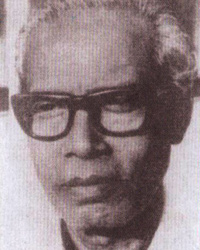 Mohammad Toaha ()
Mohammad Toaha () 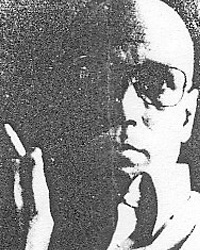 Shamsul Huq ()
Shamsul Huq () 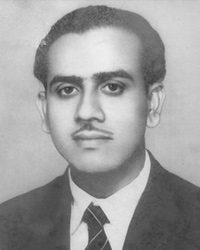 Shawkat Ali ()
Shawkat Ali () 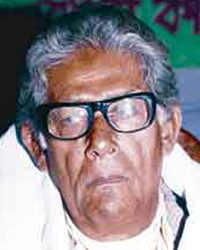 Oli Ahad ()
Oli Ahad () 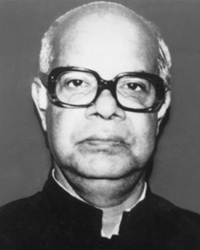 Abdul Malek Ukil ()
Abdul Malek Ukil ()
Nazimuddin agrees to 8-Point to calm agitation
In the afternoon of 11 March 1948, a meeting was held to protest police brutality and arrests. A group of students marching towards the chief minister of East Bengal Khawaja Nazimuddin's house was stopped in front of the Dhaka High Court. The rally changed its direction and moved in the direction of the Secretariat building. Police attacked the procession injuring several students and leaders including 'Sher-e-Bangla' A. K. Fazlul Huq. The next day, A. K. Fazlul Huq issued a statement condemning the police action on the students.
The situation grew worse in coming days and strikes were observed from 12 - 15 March 1948 to emphasise the grievances of the people of East Bengal.
Students, it may be noted, were at the vanguard of Bengali cultural nationalism and subsequently played a major part in the guerrilla army. The cultural threat was most severe for students. Government employment was the dream of many, even if it would be fulfilled for only a few. An Urdu-only policy would gravely disadvantage Bengali applicants in competition with West Pakistan, where the educated persons by definition had mastered Urdu. This anticipated deprivation affected relatively few people, but had a formidable mobilizing impact on those who were aroused. When joined to the relative absence of the constraints of family obligation, employment security, and generalised risk-aversion preferences which tend to accompany age, students become an explosively volatile set of cultural activists.
Students are also well equipped to elaborate and propagate an ideology of cultural protest, in the Bengali case around the richness of the language, "among the half-dozen most expressive and beautiful languages in the world", and the brilliance of its literature, with the poest Rabindranath Tagore the object of particular cult of veneration.
Crawford Young, author of "The Politics of Cultural Pluralism" (1979)
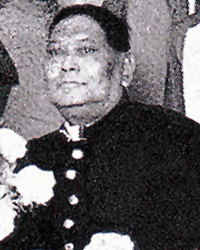 A. K. Fazlul Huq (aka Sher-e-Bangla) ()
A. K. Fazlul Huq (aka Sher-e-Bangla) ()
The very first session of the East Bengal Legislative Assembly after the creation of Pakistan was scheduled for 15 March 1948 in Dhaka. On the eve of the session, a large number of students gathered in front of Burdwan House (today's Bangla Academy), the official residence of Chief Minister Nazimuddin, to register their protest against the police action three days earlier (on 11 March 1948). This situation forced the Chief Minister Nazimuddin to change his viewpoint about calling this issue as Hindu-inspired act and on the morning of 15 March 1948, before the Legislative Assembly session got underway, he agreed to meet a delegation from the Rashtrabasha Sangram Parishad. This delegation included Prof Abul Kashem, Mohammad Toaha, Kamruddin Ahmed, Syed Nazrul Islam, Naimuddin Ahmed and Abdur Rahman Chowdhury. Khawaja Nazimuddin signed a eight-point agreement including release of all imprisoned demonstrators as a way of defusing tension in the province. He also promised that the provincial assembly, due to meet in three/four weeks time, would adopt a resolution for making Bengali as the official language and medium of instruction at all stages of education. He further agreed that the regional assembly would recommend to the Pakistan National Assembly to grant Bangla equal status with Urdu, including using it for recruitment examinations in central government.
Two most important clauses of the agreement were:
- In the April (1948) session of the East Bengal legislative assembly a special resolution will be moved to propose to the constituent assembly of Pakistan to make Bengali one of the state languages of Pakistan and to give Bengali the same status with Urdu in the competative examinations of the central services of Pakistan.
- In the month of April another resolution will be moved in the East Bengal legislative assembly to make Bengali the official language of the province of East Bengal in place of English. Besides that, Bengali will be the medium of instruction.
After the signed agreement Prof Abul Kashem informed the other students who were rallying in front of the East Bengal Legislative Assembly. But the students were not happy and expressed their dissatisfaction with the terms. They demanded to know about the agreement from Nazimuddin himself. There were a large number of students and other demonstrators outside the Assembly building. Opposition party members in the Assembly compelled Nazimuddin to speak about the agreement. Nazimuddin placed the report of his talks with the Action Committee at the Assembly. After further questions by the members of the Assembly Nazimuddin read out the terms of the agreement. Meanwhile, the demonstration outside Assembly continued unabated and the police were unable to control the situation.
Nazimuddin thought it prudent to request General Ayub Khan, the General Officer Commanding to immediately come for the protection of the Government. The Assembly was in a riotous mood. Even after the representatives of demonstrators meeting Nazimuddin the agitation had not died down. Ayub Khan met Nazimuddin in his chamber and advised him to leave at once for his residence after postponing the Assembly. After this Ayub Khan ordered the Chief Minister's car to be brought behind the Assembly building and Ayub personally escorted Nazimuddin through the old kitchen of Jagannath Hall to the car. After sending the PM Ayub came to the front of the Assembly building and told the students "the bird has flown" and the announcement was greeted with a roar of laughter and the atmosphere became less tense.
The Daily Star (Bangladesh)
One possible reason why the Chief Minister may have agreed swiftly to the 8-Point agreement was the impending arrival of Governor General Mohammad Ali Jinnah to the province four days later. Jinnah was expected to arrive in Dhaka on 19 March 1948 and Nazimuddin could not afford for this high profile visit to be sidelined by students' agitation. Anxious about preventing any unpleasant incidents during Jinnah's visit, and as a way of placating the students, ensuring there was no demonstration by the students of the Dhaka University or by the people of the city during his presence, Nazimuddin made his hasty acceptance of the conditions set by the action committee. Besides, he had hoped that on the language issue Jinnah would definitely speak in favour of Urdu, thus weakening the language movement.
Khawaja Nazimuddin probably had no intention of honouring his second promise [of recommending Bangla to Pakistan National Assembly]. Indeed, the question of the national language was never raised by the regional assembly with the authorities in Karachi during his administration. His primary objective was to calm the situation before Quaid-i-Azam Jinnah's arrival in Dhaka.
Christoph Jaffrelot, editor of "A History Of Pakistan And Its Origins" (2002)
The day after the East Bengal Legislative Assembly session, on 16 March 1948, all those arrested on 11 March were released. However, as events were to show subsequently, Nazimuddin reneged on his promise to have a resolution on Bangla be adopted by the provincial legislature.
"Bhasha Andolon a Muslim fight, no 'fifth element' involved"
Since the demand for Bengali was articulated in Constituent Assembly of Pakistan and East Bengal Legislative Assembly by Hindu members, the ruling Muslim League party tried to create the impression in the public mind that the language movement had been inspired by the hostile Hindu leaders of India. Even Dawn alleged that th language movement was due to the machinations of fifth columnists, in other words the Hindus. This was not true and Hindu leaders had little connection with it.
The movement was nurtured by the Muslims and it was carried on by the Muslim alone unaided by anyone from outside.
Dhirendranath Dutta declared during the session of CAP on 10 April 1952
Also Dr. Muhammad Shahidullah's vocal support for adopting Bengali as one of the state languages of Pakistan was crucial at that critical time when rulers were making false assumptions about the supporters of Bengali language.
Dr. Muhammad Shahidullah's overt and bold support for Bengali made it clear to the public as well as to the government that this demand was not instigated by the so-called 'fifth columnists' or imaginary 'enemies of Pakistan'.
